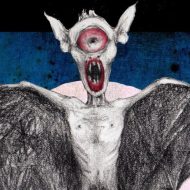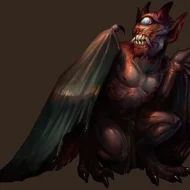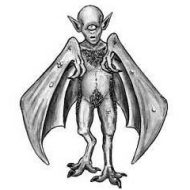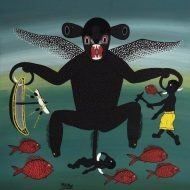Popobawa : The Evil Bat
Listen
At a glance
| Description | |
|---|---|
| Origin | East African Mythology |
| Classification | Spirits |
| Family Members | N/A |
| Region | Tanzania |
| Associated With | Shapeshifting, Flight |
Popobawa
Introduction
The Popobawa, a legendary entity, is said to have originated on the Tanzanian island of Pemba. Renowned for its nocturnal assaults on both men and women, it exhibits heightened aggression, especially towards skeptics who dismiss its existence. In Swahili, the name “Popobawa” translates to “bat-wing,” further adding to the mystique surrounding this mythical creature.
Physical Traits
In the daylight hours, the Popobawa assumes the guise of an ordinary person; however, as night falls, it undergoes a transformation into a predatory form. This hunched figure, reminiscent of a human shape, possesses gray skin emitting a sulfurous odor. Notably, it features long, pointed ears, a wide mouth brimming with fangs, and a formidable, singular eye blazing at the center of its forehead. The creature’s menacing appearance is accentuated by a pair of large bat wings, which it can skillfully wrap around itself like a cape.
The Popobawa’s capacity to alter its form adds to its formidable stature within the realm of African mythology. Various accounts describe it either as a bat-like being with wings allowing silent nocturnal travel or as a shadowy figure adept at seamlessly blending into the darkness. This uncertainty regarding its physical attributes injects an element of both fear and fascination into the intricate tapestry of the Popobawa legend.
Family
The Popobawa constitutes an integral element of Tanzania’s folklore and witchcraft traditions. Within the local culture, it is perceived as an malevolent spirit or “shetani.” In the expansive realm of African mythology, the Popobawa frequently intertwines with spirits and entities that traverse the intricate boundaries separating the physical and spiritual domains. Certain narratives draw connections between the Popobawa and jinn, supernatural beings possessing the capacity for both benevolence and malevolence.
Other names
The Popobawa is alternatively recognized as the Winged Bat. In Swahili, the plural version of its name is “mapopobawa,” employed to signify multiple instances of this dreaded spirit. Within the context of Zanzibar, it may also be referred to as “Popo Bawa” or “Popobawaa.” The array of names underscores the pervasive quality of the legend, showcasing how each community adds distinctive nuances to the narrative.
Powers and Abilities
The Popobawa is a master of metamorphosis, capable of assuming either human or animal guise. Accompanying its presence is a distinctive sulfurous odor. The creature’s single eye possesses a paralyzing effect on anyone who locks eyes with it. Disturbingly, tales abound of the Popobawa seizing control of humans, using them as conduits to disseminate ominous rumors. Beyond being a nocturnal entity, the Popobawa possesses a spectrum of supernatural powers that instill terror in those unfortunate enough to encounter it.
One of its notorious abilities is shape-shifting, allowing it to adopt various forms and instill fear in the hearts of its victims. Moreover, the Popobawa is reputed to wield the power to immobilize and manipulate those it targets, infiltrating their homes and instigating a lasting sense of dread. In certain renditions of the legend, the Popobawa specifically seeks out individuals who dare to discuss or acknowledge its existence. This chilling narrative layer intensifies the mythology, fostering a prevailing sense of vulnerability and paranoia among those wary of attracting the attention of this otherworldly being.
Modern Day Influence
The Popobawa has been the catalyst for numerous episodes of mass hysteria in Tanzania. In 1995, a significant outbreak of panic swept across the region, originating on Pemba and extending to Unguja, the main island of the Zanzibar Archipelago. This wave of hysteria further propagated to Dar es Salaam and other urban centers along the East African coast. Subsequent appearances of the Popobawa occurred briefly in 2000 and again in 2007.
During instances of Popobawa-induced panic, many individuals take measures to safeguard themselves against potential attacks. This includes staying awake throughout the night outdoors, often gathered around open fires with family members and neighbors. In certain communities, the belief in the Popobawa remains deeply rooted, influencing local customs and practices. Reports detailing alleged Popobawa encounters continue to surface, contributing to the enduring legacy of its legend.
The Popobawa has transcended its mythological origins to infiltrate various forms of media, becoming a recurring motif in literature, art, and popular culture. Its presence in contemporary storytelling not only sustains the allure of the unknown but also introduces the legend to new audiences. The perpetual fascination and fear associated with the Popobawa persist, captivating both storytellers and audiences, thereby ensuring its ongoing relevance within the cultural landscape.
Related Images
Frequently Asked Questions
What is lorem Ipsum?
I am text block. Click edit button to change this text. Lorem ipsum dolor sit amet, consectetur adipiscing elit. Ut elit tellus, luctus nec ullamcorper mattis, pulvinar dapibus leo.
What is lorem Ipsum?
I am text block. Click edit button to change this text. Lorem ipsum dolor sit amet, consectetur adipiscing elit. Ut elit tellus, luctus nec ullamcorper mattis, pulvinar dapibus leo.
What is lorem Ipsum?
I am text block. Click edit button to change this text. Lorem ipsum dolor sit amet, consectetur adipiscing elit. Ut elit tellus, luctus nec ullamcorper mattis, pulvinar dapibus leo.
What is lorem Ipsum?
I am text block. Click edit button to change this text. Lorem ipsum dolor sit amet, consectetur adipiscing elit. Ut elit tellus, luctus nec ullamcorper mattis, pulvinar dapibus leo.
What is lorem Ipsum?
I am text block. Click edit button to change this text. Lorem ipsum dolor sit amet, consectetur adipiscing elit. Ut elit tellus, luctus nec ullamcorper mattis, pulvinar dapibus leo.







